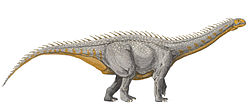Huayracursor
| Huayracursor Temporal range:
Late Triassic, | |
|---|---|

| |
| Reconstructed skeleton of Huayracursor (known remains in orange) | |
| Scientific classification | |
| Kingdom: | Animalia |
| Phylum: | Chordata |
| Class: | Reptilia |
| Clade: | Dinosauria |
| Clade: | Saurischia |
| Clade: | †Sauropodomorpha |
| Clade: | †Bagualosauria |
| Genus: | †Huayracursor Hechenleitner et al., 2025 |
| Species: | †H. jaguensis
|
| Binomial name | |
| †Huayracursor jaguensis Hechenleitner et al., 2025
| |
Huayracursor (lit. 'wind runner') is an extinct genus of early sauropodomorph dinosaurs known from the Late Triassic (Carnian age) Santo Domingo Formation of Argentina. The genus contains a single species, Huayracursor jaguensis, known from a partial articulated skeleton.[1]
Discovery and naming
[edit]The Huayracursor holotype specimen, CRILAR-Pv 151, was discovered in outcrops of the Santo Domingo Formation near Vinchina in La Rioja Province, Argentina. The specimen consists of a nearly complete skeleton, including cranial remains, found in articulation.[1]
In 2025, Hechenleitner and colleagues described Huayracursor jaguensis as a new genus and species of sauropodomorph dinosaur based on these fossil remains. The generic name, Huayracursor, Quechua word huayra, meaning "wind", with the Latin word cursor, meaning "runner". The specific name, jaguensis, references the Jagüé village.[1]
Classification
[edit]
In their 2025 phylogenetic analysis, Hechenleitner and colleagues recovered Huayracursor as an early-diverging member of the Sauropodomorpha. Their results placed Huayracursor, as the sister taxon to Bagualosaurus, as the earliest branch of the more inclusive clade Bagualosauria. These results are displayed in the cladogram below:[1]
| Sauropodomorpha |
| |||||||||||||||||||||||||||||||||||||||||||||||||||||||||||||||
References
[edit]- ^ a b c d Hechenleitner, E. Martín; Martinelli, Agustín G.; Rocher, Sebastián; Fiorelli, Lucas E.; Juarez, Malena; Taborda, Jeremías R. A.; Desojo, Julia B. (2025-10-15). "A long-necked early dinosaur from a newly discovered Upper Triassic basin in the Andes". Nature: 1–6. doi:10.1038/s41586-025-09634-3. ISSN 1476-4687.











